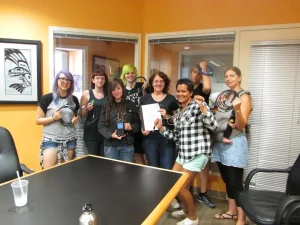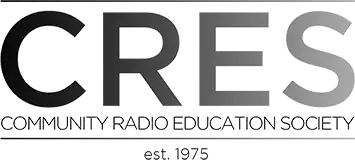Previous Projects
Internships
Vancouver Co-op Radio along with the Vancouver Community Network offered paid internships once a year to youth in Vancouver who were interested in learning about computers, audio and the general workings of a radio station. Our interns were given extensive hands-on training with expert technicians and are prepared to enter the workforce with a broad technical skill set. Our past interns have found work in a variety of fields, including audio recording, live sound engineering, website building and webhosting.
The station now works with numerous institutions to continue to offer paid internships.
Step up and solder!
 Step Up and Solder! Women in Tech Training Program provided instruction, training and hands-on skills for marginalized women looking to enter audio-related technical fields. Over the two-phase program, participants learnt skills and gained hands-on experience within a radio environment through workshops and mentorship. The training was provided in a supportive environment to women who traditionally face barriers to employment in these male-dominated technical fields. The program prepared women for positions and further training as sound engineers, electronics technicians, audio technicians, recording engineers, music producers, electrical engineers, electricians, audio-visual technicians and/or technical entrepreneurs.
Step Up and Solder! Women in Tech Training Program provided instruction, training and hands-on skills for marginalized women looking to enter audio-related technical fields. Over the two-phase program, participants learnt skills and gained hands-on experience within a radio environment through workshops and mentorship. The training was provided in a supportive environment to women who traditionally face barriers to employment in these male-dominated technical fields. The program prepared women for positions and further training as sound engineers, electronics technicians, audio technicians, recording engineers, music producers, electrical engineers, electricians, audio-visual technicians and/or technical entrepreneurs.
The focus was on supporting this transition of these women to employment after the program by connecting them with people in the industry, providing resume workshops and job readiness skills. People commonly acquire their first paid position in these fields after a training or internship program such as this one. Since many technical and trades positions begin with a trial period, the confidence gained by participants from their hands-on training allowed them to perform effectively during the key initial weeks on a new job.
One of the more interesting outcomes of the Step Up and Solder! program was not related specifically to electronics, but rather to how the participants approached problem solving and troubleshooting. Initially, some of the participants were nervous about not having knowledge in particular areas. We encouraged the women to challenge these ideas and to trust their own logical reasoning and problem-solving abilities. The women in the program soon began to use one another as a resource and very quickly started to feel more comfortable with applying some of the more fundamental pieces of knowledge we provided to more complex situations. This type of trouble-shooting and problem solving is empowering, and embodies the belief that you are capable of finding solutions. By the end of the program, the participants felt more confident and began to ask more questions and ultimately to explore potential solutions. Some of the women report back that this particular skill is something that they use in areas outside of electronics and technical applications. Of course, the practice of holding and using tools and soldering irons and the lessons in electronics basics are important too; however, the confidence gained in learning how to trouble-shoot among the participants in the program was a nice bonus.
